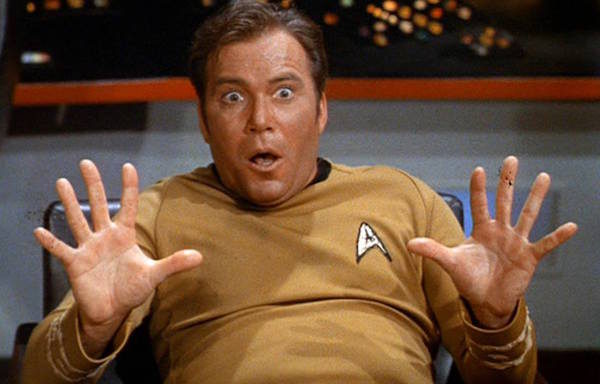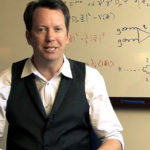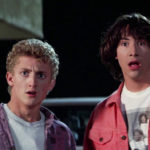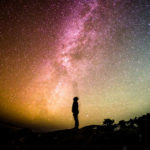The Big Problem with Sean Carroll’s “Poetic Naturalism”
by Brandon Vogt
Filed under Atheism, Christianity and Science, Cosmology

Today we continue our look at Sean Carroll's anticipated new book,The Big Picture: On the Origins of Life, Meaning, and the Universe Itself (Dutton, 2016).
Carroll starts his book by diving right into the deep end. The first chapter in the first section concerns a huge topic: the fundamental nature of reality. Carroll explains that philosophers consider this the domain of ontology, but then he offers a strange definition. Ontology, he says, is "the study of the basic structure of the world, the ingredients and relationships of which the universe is ultimately composed" (10).
Unfortunately, this is the first of several confusing errors in his book. There are two major problems in this case. First, it's simply the wrong definition. Ontology is the study of being qua being, or the study of existence. Physics is the study of the basic physical ingredients that make up the world. By getting this definition wrong, Carroll has already begged the question in the first few pages of his book. He's smuggled his conclusion—that physics can adequately answer questions about ontology—into his definition of ontology. It's a simple mistake, but it has profound effects. Instead of putting forth arguments that physics can justly and completely account for the fundamental nature of reality, Carroll simply defines the study of fundamental reality in physicalist terms.
To his credit, Carroll does express caution about any naturalist ontology. He admits that, "Naturalism presents a hugely grandiose claim, and we have every right to be skeptical...Naturalism isn't an obvious, default way to think about the world" (13). It certainly seems, at least to most people, that there is more to reality than collections of impersonal atoms and laws. Therefore if naturalism is true, Carroll affirms, its supporters "need to make the case" for it (13).
That's precisely what he aims to do throughout the rest of his book. His goal is to show how all of reality can be accounted for in naturalist terms, without recourse to God, souls, free will, or anything supernatural. And in Carroll's view, that's best done through a worldview he's coined "poetic naturalism".
What is Poetic Naturalism?
Carroll holds that, "The world is what exists and what happens, but we gain enormous insight by talking about it—telling its story—in different ways" (19). While straight naturalism tells us that the world revealed to us by scientific investigation is all there is, we still need ways of talking about that world. That's where poetic naturalism comes in.
According to Carroll, the "poetic" aspect of poetic naturalism, or what separates it from other naturalist schemes, can be summarized in three points:
- There are many ways of talking about the world.
- All good ways of talking must be consistent with one another and with the world.
- Our purposes in the moment determine the best way of talking.
In other words, the same reality can be described in many different ways, using different stories or concepts. We don't only have to rely on the descriptions of fundamental physics.
Carroll offers a concrete example. For the poetic naturalist, Captain James T. Kirk is both a collection of atoms stretching through space and time (when we're telling a story about his fundamental nature) and a human person who captains the starship USS Enterprise (when describing him at a higher, macroscopic level.) This would be a different approach than, say, eliminativism (or eliminative materialism, or what some people just call straight naturalism). On that view, the latter definition of Captain Kirk would be nothing more than illusion. It may seem like Captain Kirk is more than a collection of atoms, but that's simply false—it's illusory. Poetic naturalism "strikes a middle ground, accepting that values are human constructs, but denying that they are therefore illusory or meaningless" (5).
Within poetic naturalism, Carroll distinguishes three "levels" of storytelling. First is the fundamental reality, the deepest (usually microscopic) way of describing the universe. This is where we talk about reality at rock bottom. The second level includes "emergent" or "effective" descriptions, which are valid within some limited domain. This level is where we see concepts like ships, dogs, animals, books, games, shapes, and more. The third and final level is reserved for values, "concepts of right and wrong, purpose and duty, or beauty and ugliness" (21).
The point of poetic naturalism is that these three levels don't necessarily conflict. You can, for example, talk about "dogs" (a level two concept) to your wife and kids, but then when you're in the laboratory, reduce dogs conceptually to fundamental particles. Different ways of talking are appropriate for different domains of life.
Poetic naturalism is clearly the main idea of Carroll's book. In fact, all other chapters simply apply the poetic naturalist framework to each of life's Big Questions. So that's why before diving in to those specific questions, it's worth asking a more basic one: is poetic naturalism true?
The Big Problem with Poetic Naturalism
Among scientists, there's a long, ongoing dispute about the goal of science. Is science about finding truth, or is it primarily concerned with adequately describing the world? In the twentieth century, the so-called instrumentalists, led by John Dewey and Karl Popper, took the latter view. They held that scientific theories are just practical tools used to map the world around us in order to achieve useful ends (like finding cures and inventing technology). In other words, if a scientific theory "works", then it's good one; if a theory comports with the available empirical data and leads to good results, it's successful.
Suppose a chemist was exploring malaria parasites, and she haphazardly devised a theory that yielded an effective malaria cure. Even if the science behind the theory was dubious, an instrumentalist would say it was a good one.
But here's the problem: sometimes a scientific theory can "work" even when that theory is false. In our malaria example, perhaps the chemist's theory was useful but false. Maybe her theory was flawed even though it resulted in a good end, namely a cure for malaria.
This isn't a rare situation. The history of science is littered with examples. Two significant ones would be geocentrism and Newtonian physics. In both cases, the theories matched our observable data to theretofore unheard of accuracy. Defenders of each theory occupied at one time just the same position that Carroll does now in regards to poetic naturalism: they thought the evident success in prediction, explanation, and description made it nearly impossible, or extremely unlikely, the theory was false, and the remarkable achievements made possible by these theories, false or not, made them good theories.
But we now know both theories are false (or, in the case of Newtonian physics, at least incomplete and fundamentally inaccurate.)
Throughout The Big Picture, it becomes clear that Carroll is most interested in harmonizing the many useful stories we tell about the world. That's the aim of poetic naturalism. The problem, as with geocentric and Newtonian theories, is that the journey toward truth often veers from the path of pragmatism. What's true isn't identical to what works.
(For more background on this distinction, read Mitch Stokes' excellent new book, How to Be an Atheist: Why Many Skeptics Aren't Skeptical Enough.)
So that gets to the biggest problem, in my view, with Carroll's poetic naturalism:
It's preferred because it's useful, not because it's true.
Two More Problems with Poetic Naturalism
There are at least two more flaws with poetic naturalism, both of which affect all forms of naturalism. First, poetic naturalism is self-limiting. Carroll tries to answer the big metaphysical questions noted in the book's subtitle, but since he's closed to supernatural answers, his answers are constrained and unsatisfying. They don't survey the full range of possible solutions. As we'll come to see in later posts, this is why he answers many of the biggest questions with some form of, "Well, we just don't know because science hasn't confirmed that yet...but we're confident it will one day." That answer, of course, is unsatisfying, especially in light of the book's grandiose scope, for even a child can give "we don't know, but maybe one day" answers to life's Big Questions. Those are really non-answers, but they're doubly worse because they neglect possible answers that may lie outside the purview of science.
A second problem with poetic naturalism is that it's self-refuting. As many thinkers have observed over the years, from C.S. Lewis to Victor Reppert, William Hasker, and Alvin Plantinga, if naturalism is true, then it seems to leave us with no reason for believing it to be true. Why? Because all judgments would equally and ultimately be the result of non-rational forces. Thus even if it was true, we would have no good grounds for believing it.
In the next post, we'll examine what happens when Carroll applies his poetic naturalism to a question of ongoing interest here at Strange Notions: did the universe have a First Cause or did it just move itself?
Related Posts
Note: Our goal is to cultivate serious and respectful dialogue. While it's OK to disagree—even encouraged!—any snarky, offensive, or off-topic comments will be deleted. Before commenting please read the Commenting Rules and Tips. If you're having trouble commenting, read the Commenting Instructions.












